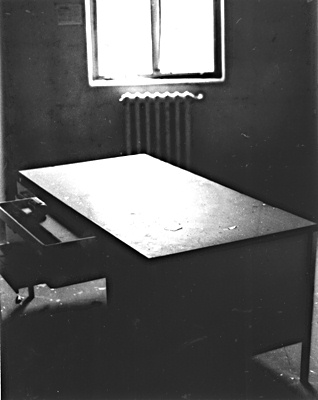All Nonfiction
- Bullying
- Books
- Academic
- Author Interviews
- Celebrity interviews
- College Articles
- College Essays
- Educator of the Year
- Heroes
- Interviews
- Memoir
- Personal Experience
- Sports
- Travel & Culture
All Opinions
- Bullying
- Current Events / Politics
- Discrimination
- Drugs / Alcohol / Smoking
- Entertainment / Celebrities
- Environment
- Love / Relationships
- Movies / Music / TV
- Pop Culture / Trends
- School / College
- Social Issues / Civics
- Spirituality / Religion
- Sports / Hobbies
All Hot Topics
- Bullying
- Community Service
- Environment
- Health
- Letters to the Editor
- Pride & Prejudice
- What Matters
- Back
Summer Guide
- Program Links
- Program Reviews
- Back
College Guide
- College Links
- College Reviews
- College Essays
- College Articles
- Back
Deprived Knowledge
At the end of the year in middle school, the administration set up bins for your school supplies labeled “waste” and “reusable.” But of course, the only thing we were concerned with was getting out of school and getting rid of our supplies. So naturally we weren’t focused on separating our reusable divider and notebooks from our ratty, ripped binders. We just threw everything into the trash.
In a small provincial town of the Philippines, children scrapple for resources. Their lives are plagued by poverty and housework. Their main concern is how to support their family. So it’s understandable that when you’re worried about how your family is going to get by, education takes a back seat.
About “45% of solid waste” comes from schools and of that share, “40%” is recyclable. Many of our educational resources are reusable and still functional. More than half of that solid waste can be refurbished, so why waste? Even if a pencil is down to a stub and has about an inch left of lead, it’s still usable. So what if you only used one side of a paper? Your binder may be dirty and scratched, but it still does the job. There’s still potential use to all of these items. They may not hold value to us, but to someone who has almost nothing, they may be cherished as blessings.
Provincial schools in the Philippines and other developing countries suffer from declining education and a lack of resources. These schools make use of all the supplies they can get. They have an abundance of students, eager to be educated. But sadly, many schools cannot attend to all the children or offer them adequate knowledge because of their meager resources. Especially in the Philippines, “underfunding” has deemed the school system “incapable of providing children with a basic education.”
What about us? What about the US? We have such an abundance of knowledge and resources and privilege and opportunities. We have numerous policies, such as the No Child Left Behind Act , which ensure every child the right to an education from K-12. We are so fortunate to have these advantages. But just because we have these excesses doesn’t mean we should apathetically go around wasting them. We leave pencils, erasers, and pens anywhere, as if they’re not still useful. We may be able to afford to throw out half-used notebooks and childish books we no longer find necessary, but those are luxuries that could benefit other schools and children.
It’s unfair that we have so many opportunities and we choose to waste them, when in the Philippines, 2/3 of provincial families are never educated past Grade 6. It’s unfair that many of us think nothing of unused books and materials. Any resources would be much appreciated in developing countries.
So how do we change? How do we help? How do we care?
In Filipino culture, many families send boxes of goods and extra resources to relatives back in the Philippines. More families should implement this, not just those of Filipino culture. Families could compile old, irrelevant books, notebooks, pens, pencils, clothing, etc. This would greatly help the crisis of underfunding and lack of materials.
In addition to donating supplies, we can fund organizations that work exclusively to help the poor. For example, Gawad Kalinga (GK) is a Philippine-based movement that aims to end poverty. They do so by creating fundraisers and programs such as building houses. If we give our time to organizations like GK, we can help accomplish the goal to end poverty and better the lives of people in developing countries. Working to improve the poverty conditions would help the education crisis, as poverty is one of the “main reasons cited” for the drop in school attendance.
By applying some of these solutions, we can help those less fortunate than us. We can share our assets and support developing countries. Hopefully these efforts will help the unfortunate education systems in the Philippines because every child deserves a sufficient education. Honestly, any contribution would be helpful to the conditions they’re under. So it may be worth your time and someone else’s education to pay attention to those donation boxes at school.
The Shocking Stats Behind Back-to-School Waste (Infographic). TreeHugger. 5.
Raya, Rene R. The Missed Education of the Filipino People. Social Watch. 10.
Lubao, Dylan. Classes Begin in Philippines as Education Crisis Worsens. World Socialist Web Site. 18 June 2013. 3.
No Child Left Behind Background & Analysis. New America Foundation. 24 April 2014. 1.
Collas-Monsod, Solita. Education and Poverty Reduction. Phlippine Inquirer. 31 May 2008. 5.
Welcome to Gawad Kalinga. Gawad Kalinga. 1.
Raya, Missed Education, 10.

Similar Articles
JOIN THE DISCUSSION
This article has 0 comments.
